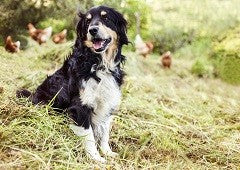Dogs and chickens. At first thought, they may not seem like the ideal companions, but contrary to popular belief you can in fact keep both of these marvellous creatures and have a harmonious backyard. They not only make great friends, they can even protect each other from harm! “Yes, yes - but this won’t be the case with my dog” we hear you say. “My dog is different, and will definitely eat the chickens!” Well, from Jack Russells to German Shepherds, we’ve seen the proof that any dog of all shapes and sizes can get along with a backyard flock of chickens - take it from some of our thousands of followers, readers, subscribers and customers who have kindly sent us in their stories and photos, and shared with us their tips and advice when it comes to keeping dogs and chickens together in the same household. It’s doable, we’ve done it ourselves!
Jennifer Morris - Proud owner of one Staffordshire Bull Terrier and 3 Rhode Island Red Chickens!
The Morris household backyard is a harmonious one - their Staffordshire Bull Terrier and three Rhode Island Red chickens get along famously. They even free range together in the backyard, and are often “`caught sharing food and the dogs bed - the dog has never attacked, bitten or chased our chickens.” Sounds like a beautiful family of animals! Jennifer took us through how she managed to facilitate such a peaceful, friendly relationship between her family pets.
“[Our dogs and chickens] are often caught sharing food and the dogs bed - the dog has never attacked, bitten or chased our chickens.”
You may be thinking this blissful situation is out of your grasp - but we assure you, it’s really not. With training and patience, your animals can live peacefully together in the same household. Read on as we chat to Jennifer about the practical steps she took to train her dogs and chickens to be so calm and friendly towards one another.
-
The first introduction
Jennifer initially had the family dog before getting chickens, so took care to slowly and carefully introduce the animals for their first meeting. “Introducing them was really easy for us as we have a cat enclosure that we let the chickens stay in for 2 days (clearly without the cats!) The dog could see and smell them but couldn’t get to them.”
-
Letting them see each other face-to-face
Jennifer noticed that initially, the dog seemed excited - however this soon dissipated as the dog got more familiar with the chickens behaviours and appearance. After a few days, she became confident enough to let the two meet without any barriers - under strict supervision of course! “On the 3rd day we just opened the enclosure so the chickens could come out whenever they pleased - by that stage, the initial excitement was gone and the dog didn’t care.”
“On the 3rd day we just opened the enclosure so the chickens could come out whenever they pleased - by that stage, the initial excitement was gone and the dog didn’t care”
During the first few weeks, Jennifer noticed that her chickens were still adjusting to their new home and the introduction of a new animal into their lives - they were a bit skittish at first, and it took them “a good 3 weeks to settle into their environment”, but after that the dogs and chickens were perfectly relaxed and at ease with each other.
[kros_countryspecificcontent include="USA" exclude"AUS"]
Poultry Fencing is a great way to slowly introduce chickens to the rest of the family.
-
The key to success
Jennifer says the key to getting the dogs and chickens comfortable with one another is to keep an eye on their behaviour, and make judgements from their reactions. “We really just went by our dogs reaction to them. If the chickens made a noise or moved and [her behaviour changed to become] alert or curious, we knew it was too soon to have them living together - once she no longer cared for them and what they were doing, we knew that was the right time to let the chickens out and see how she went.”
Top tips from Jennifer's story:- Start by allowing the animals to see each other through the safety of a barrier.
- Always strictly supervise the first few face-to-face interactions when you let the chickens out for the first time.
- Let your animals take their time to adjust - whether its days or weeks
- Observe your animals behaviour closely - it will tell you a lot about how your animals are feeling and the relationship between them.
If you’re introducing your dog to your chickens, you can definitely use one of our chicken coops such as the Taj Mahal, Penthouse and Mansion w/Mansion Run to separate the animals for the initial greeting - the chickens will be protected behind the galvanised wire mesh walls of the run, but the dogs will be able to see, sniff and observe your flock easily.
Dogs and chickens can certainly co-exist peacefully and become great friends - if you need more help or are curious about the topic, check out our other articles on dogs and chickens on our Learning Centre. If you’re currently training your dog to get along with your backyard flock, please email through photos and share your stories - we love telling our followers about friendships between all animals - furry, feathered and fuzzy!
As chicken keepers, we want harmony amongst our flock and extended animal family. It's vital that we do an eggcellent job when caring for our feathered friends. Many chicken keepers struggle to handle chicken health or behaviour issues, especially in the first few years of having a flock.
This is why I recommend Chickenpedia to all my readers. They have comprehensive online courses on everything you didn’t know you need to know and then some more! From healthcare to raising baby chicks to feeding and behavior, you’ll find beginner-friendly courses that’ll give you the knowledge and confidence to successfully look after your chickens.
As a member, you will get access to ALL their fantastic courses. No need to wing it, become the ultimate chicken eggspert! Check out Chickenpedia today!


















